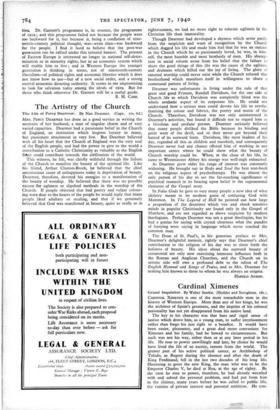The Artistry of the Church
The Life of Percy Dearmer. By Nan Dearmer. (Cape. los. 6d.)
MRS. PERCY DEARMER has done us a good service in writing the memoirs of her husband, a man of singular charm and of very varied capacities. Dearmer had a passionate belief in the Church of England, an institution which inspires loyalty in many, but passionate attachment in very few. But Dearmer believed with all his heart that the Church of England was the very soul of the English people, and had the power to give to the world a contribution to a Catholic Christianity as valuable as the. English Stine could contribute towards the civilisation of the world.
This witness, he felt, was chiefly withheld through the failure of the Church to manifest the beauty of the spiritual life. Like his friend, Arthur Clutton-Brock, he believed that the chief unconscious cause of unhappiness today is deprivation of beauty. Dearmer, therefore, devoted his energies to a manifestation of the beauty of worship. He believed that there was no possible excuse for ugliness or slipshod methods in the worship of the Church. If people objected that bad poetry and vulgar colour- ing were dear to the hearts of the people he would reply that many people liked adultery or stealing, and that if we genuinely believed that God was manifested in beauty, quite as really as in righteousness, we had no more right to tolerate ugliness in the Christian life than immorality.
Though Dearmer had developed a shyness which arose partly from the suspicion and want of recognition by the Church which dogged his life and made him feel that he was an outcast in the Church which he so passionately loved, he was, in him- self, the most humble and most brotherly of men. His absorp- tion in social reform arose from his belief that the failure to share the good things of this life was the cause of the ugliness and drabness which killed out the joy of living. The glory of external worship could never exist while the Church refused that brotherhood which manifests itself in willingness to share a communal pattern of living.
Dearmer was unfortunate in living under the rule of that great and good Primate, Randall Davidson, for the one side of Church life to which Davidson was completely blind was the whole aesthetic aspect of its corporate life. He could not understand how a serious man could devote his life to revolu- tionising the colour and fabrics, the poetry and music of the Church. Therefore, Davidson was not only uninterested in Dearmer's activities, but found it difficult not to regard him as a frivolous and profane person. Dearmer seriously believed that many people disliked the Bible because its binding and print were of the devil, and so they never got beyond their hatred of its outward form. Davidson, like most leaders of his day, regarded all this as childish and mawkish, and consequently Dearmer never had any chance offered him of working in any important centre where he could show what the beauty of Church worship could be. When, at the close of his life, he came to Westminster Abbey his energy was well-nigh exhausted.
As Dearmer grew older his range of interest was constantly widening. He brought out in Body and Soul the best text-book on the religious aspect of psychotherapy. He was almost the only parson of his day to see the far-reaching significance of psychical research in its bearing upon belief in the supranormal elements of the Gospel story.
In False Gods he gave to very many people a new idea of what idolatry meant in its modern guise of confusing God with Mammon. In The Legend of Hell he pointed out how large a proportion of the doctrines which vex and shock sensitive minds in popular Christianity are found only in the Gospel of Matthew, and are not regarded as above suspicion by modern theologians. Perhaps Dearmer was not a great theologian, but he had a genius for saying with crystal clearness what the pundits of learning were saying in language which never reached the common man.
The Dean of St. Paul's, in his generous preface to Mrs. Dearmer's delightful memoir, rightly says that Dearmer's chief contribution to the religion of his day was to show forth the holiness of beauty. His ideas about the outward beauty of ceremonial are only now exercising immense influence both in the Roman and Anglican Churches, and the Church on its artistic side will owe a profound debt to the editor of The English Hymnal and Songs of Praise, and to Mrs. Dearmer for making him known to those to whom he was always an enigma.
HAROLD ANSON.


































 Previous page
Previous page